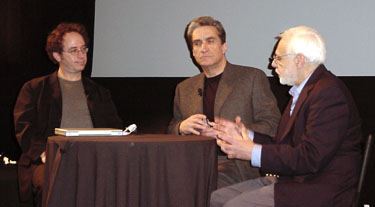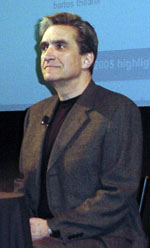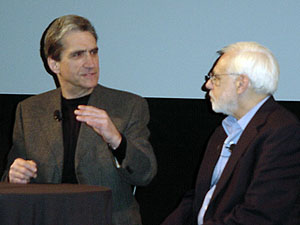|
A Conversation With Robert Pinsky Thursday,
Feb. 23, 2006 |
|||
|
In this
wide-ranging conversation, the former Poet Laureate Robert Pinsky
will discuss his collaboration on an opera with Tod Machover
of the Media Lab, his ongoing Favorite
Poem Project, his ideas about poetry and democratic culture,
and his recent prose book, The Life of David, an account
of the biblical poet-king. Forum Director David Thorburn will
moderate the forum. During the day of the forum (Thursday, Feb. 23), Tod Machover will twice present a 15-minute fragment from the opera Death and the Powers in Bartos Theater. Screening times: 2-2:30 pm and 3-3:30 pm. Each screening will be followed by a brief discussion. [Events co-sponsors: Literature Section, Angus N. MacDonald Fund and Writing and Humanistic Studies, Associate Provost for the Arts, Council for the Arts at MIT] Speakers
Tod
Machover is head of the Media Lab's Hyperinstruments/Opera
of the Future group. Machover is also the creator of the Toy
Symphony, an international music performance and education project.
Machover was formerly director of musical research at Pierre
Boulez's IRCAM institute in Paris. A webcast
of A Conversation with Robert Pinsky
is now available from MIT
World. Tech Talk article about forum (Feb. 28). [The following is an edited summary not a verbatim transcript.] (Several clips are shown of Death and the Powers , an opera in which a Rupert Murdoch/ Walt Disney-like character decides to have his consciousness ported into a computer. This creates complications with his family, as well as the international economy.) DAVID THORBURN: Did you encounter much difficulty in the composition process, moving from poetry to opera? ROBERT PINSKY: I think there's a great freedom in working in a new medium. I knew that Tod was going to help me set it to music, and I wrote it for that purpose. I don't know much about modern music, but it's very exciting to me. My only complaint is that it can be difficult to understand, but thankfully we have supertitles. THORBURN: Let's talk about the sequence of the work. Robert did all his work first, then Tod? TOD MACHOVER: I write best when I'm writing to text, I feel inspired by it. I needed the words in front of me to write the music. I worked with Robert, talking about the story, but I didn't start writing until I saw the text. PINSKY: It has a lot of ethnic and political humor. We had a false start... MACHOVER: Only one? PINSKY: A number of changes have been made, down to specific syllables. There's been a great deal of collaboration as we try different approaches. MACHOVER: In the old days, you could plan the structure of an opera better. This was a more fluid process.
PINSKY: We made a quartet out of what was originally going to be a monologue. Rather, it became a trio, and then a quartet. But it was originally written for one speaker, probably because I'm new at this. THORBURN: How long does the opera run? MACHOVER: About ninety minutes without an intermission. It's a fast work, so there's not a lot to cut. THORBURN: Is any information available online yet? MACHOVER: Some pictures and set designs are available. More will be soon. PINSKY: The web seems to dramatize collaborations. I was excited by Tod's music, by Alex's McDowell's set designs. The robots are primarily made of light. They begin as one. MACHOVER: Tell them about the robot prologue. PINSKY: After the robots come apart, the leader tells the others to put on a performance, and they become the characters. At the end, they re-coalesce. One robot doesn't understand why they're performing this ritual, and has to be convinced. So there's a partially explained back-story: where did all the humans go? The conversations they have are written in English on the supertitles, but onstage, they're speaking robot. THORBURN: Let's turn now to another of Robert's collaborative projects, begun when he was Poet Laureate, The Favorite Poem Project.... PINSKY: I invited Americans to write to me with their favorite poems, poems that had inspired them and that they'd be willing to read for a national archive. My advertising budget for this project was seven dollars, but I received tens of thousands of responses. Some of those responses were collected into a book called An Invitation to Poetry, which includes a DVD of people reading their favorite poems. PINSKY: We worked with independent directors and producers, so we didn't have to pay for transportation. The project highlighted a great many people not normally associated with poetry. THORBURN: This activity seems to be very democratic in nature, implying that poetry belongs not to elites, not to poets and professors, but to the larger community. But of course some poets and defenders of poetry see the project negatively, a kind of sellout. PINSKY: Or you could look at it as creating a new elite – a true elite of people who respond to poetry. This substitutes for our culture's usual academic elite, who are often not very close to the art of poetry, and also for the performer elite that dominates most of our culture. Instead of royalty, we have celebrities. This is an improvement—far better to revere someone because they can throw a ball like hell than because of who their great-grandfather was—but this is different. This is an art in which the reader's body is the medium. Whitman is dead. John Doherty is alive. Doherty's breath saying Whitman's words becomes Whitman's medium. Art that is inherently connected to the human scale is respected, and serves an important function in a democratic society. The artist is dead, but the reader's breath, real or imaginary, connects to it. It's a form of possession of the dead. Whitman speaks through Doherty's body. THORBURN: Can that happen just through silent reading? Why does poetry have to be read aloud? PINSKY: Poetry is an art that uses as its material the sounds of language. Ezra Pound said that prose is shooting an arrow, but poetry is shooting an arrow on horseback. If you read a poem and don't think of the sounds, you'll miss the poem. You'll also miss the poem if you're stupid, as poetry is an art of the mind. Every art is somehow physical in nature. THORBURN: Let's show a selection, “The Sloth,” by Theodore Roethke, recited by Christine Bauch, a grade-school student. (a clip is shown of reading) PINSKY: She talks about the onomatopoeia, though she doesn't use that word. Often, academics will lecture on poetry, but when they read it, it's clear they haven't heard it, haven't listened to the sounds. Every art has its technique and demands. The things the people in the collection say are cogent. Also, there's a more overtly elitist element, in that I chose which people would be selected for the book and DVD. THORBURN: When Pinsky was first published, he was influential in part because he seemed new, because his work seemed to have a newly conversational feel, a colloquial energy. Over time, however, his work becomes more compressed, more difficult, more like incantation. Do you remember a moment in your writing when you felt your work changing in this way?
THORBURN: This might be a good time to read “Shirt.” PINSKY: “Shirt” goes all over the map intellectually, but the poem is dominated by substantives. (PINSKY reads “Shirt.”) SHIRT The back, the yoke, the yardage. Lapped seams, Gossiping over tea and noodles on their break Of cuff I button at my wrist. The presser, the cutter, At the Triangle Factory in nineteen-eleven. The witness in a building across the street Away from the masonry wall and let her drop. A third before he dropped her put her arms He stepped up to the sill himself, his jacket flared Like Hart Crane's Bedlamite, “shrill shirt ballooning.” Corners of both pockets, like a strict rhyme Invented by mill-owners inspired by the hoax of Ossian, Bailey, MacMartin. The kilt, devised for workers The docker, the navvy. The planter, the picker, the sorter George Herbert, your descendant is a Black And feel and its clean smell have satisfied The buttonholes, the sizing, the facing, the characters THORBURN: The later poems get even more visionary, but I want to make a transition to the final topic. Your new book, The Life of David, is written in prose, but reads in some ways like a long poem. It appears at first to move almost at random, but by the end it becomes apparent that this material is richly coherent. Why David? PINSKY: I'll try to unite all those ideas. Syntax is to poetry as melody is to music. It connects things over time. On some level, poetry has to be something someone would say. The David book is about being Jewish. Jews all over the world are a highly syncretic, possibly even synthetic people, in the sense of synthesis. They connect themselves to what is around them. David might be a more important Jewish figure than Abraham, but rabbis today argue over whether or not he's even Jewish. David is a killer and a poet, an artist and a politician, a terrible person and a great person. He connects many things, and just as one is interested in connections through syntax, one is interested in the connections inherent in David. Discussion QUESTION: You stress the importance of the human voice in poetry. In my experience, my favorite poems are the ones I've memorized, though I can't say whether I memorized them because I love them or I love them because I memorized them. Is voice a re-embodiment of the poem's spirit? PINSKY: I think it's important to remember that poetry is a vocal art, though not necessarily a performative art. A poem is a part of your body. A poem “happens” each time it is read; the written version is a notation, not the poem itself. I recommend the DVD packaged with Invitation to Poetry to understand this. THORBURN: Robert, you and I were at Stanford when a very important critic named Yvor Winters was teaching. Could you talk about him a bit? In many ways your career has not been what he might have imagined for you. PINSKY: I don't know if that's true. I remember when another teacher of ours, Bud Fifer, had a story about reading applications with Winters. Fifer thought he could please Winters by dismissing an applicant who said that the most important part of poetry, for her, was the sounds of the words; Winters surprised Fifer by agreeing. THORBURN: His emphasis was very emphatically rationalist, and many people felt he emphasized rationality at the expense of emotion. PINSKY: He was irritated by many of his own adherents who he felt were too uninterested in emotion. I asked him once how he felt about nuns taking his classes, and he looked worried. We tended to argue with him rather than simply agree, when he would rail against a poet he disliked. THORBURN: Winters was famous for dismissing icons of the field and celebrating obscure poets. QUESTION: Why is rhyming poetry no longer written in English? PINSKY: That's a common assumption, but it's not true. Thom Gunn, for example, is a master of rhyme; I use iambic pentameter in some of my poems. Structure hasn't gone away in poetry. I think people read so much bad free verse poetry that they don't realize that bad rhyming poetry is still being written. QUESTION: Death and the Powers concerns a man who wants to be made into a robot. As a poet, does the idea of becoming a robot bother you? Do you think robots will ever write poetry? PINSKY: The character in Death and the Powers doesn't see himself as becoming a robot, but becoming pure spirit. He's seeking to escape the machine of the flesh. “Robot” comes from a Czech word meaning “worker,” and in that sense, we all aspire to be robots. I'm interested in artificial intelligence, and wanted the story to have some complexity. I didn't just want to write another Frankenstein story about technological hubris. QUESTION: Dr. Thorburn, you said that David was a departure for Pinsky. I take mild exception. In Pinsky's poem about Daniel, he dealt with similar themes and techniques. PINSKY: That's true. The idea of retelling a story in a new way is distinctly human. We make art all the time, in retelling stories. Stories as great as this read us even as we read them. QUESTION: Say it is 2070. Will the poet laureate be propped up by [aesthetic] structure or by subject? PINSKY: I think poetry will begin with the body. Will there be people who want to say the words other people wrote earlier? I think so. The poet laureate won't be important in 2070, I don't think. It's just a title. But poetry will still be about the sounds of the words. QUESTION: I found what you said about the difficulty of writing poetry very moving, but not all poets agree. Is it ever easy for you? PINSKY: It can be made to look easy. Sometimes jazz musicians will play something beautiful and incredibly complicated, and it'll seem as easy as breathing. But the musician still had to study. You have to work hard before it can be easy. Sometimes it's fun to say that it's hard to write a good poem, sometimes it's not. I think humans enjoy difficulty, when you feel that you're doing what you should be doing. At risk of going off-topic, I think the way the Bush administration has manipulated 9/11 has changed my poem. Since then, I've spent a great deal of time revising it. THORBURN: Once Robert published a poem in The New Yorker , and when I emailed him to say there was a line I didn't understand it, he decided to revise it. You say it's important to you that poetry be accessible. Your work is grounded in something like this idea. Yet so much poetry today seems not rationally understandable, genuinely obscure. Would you be willing to say something about the condition of poetry?
PINSKY: Nobody knows the condition of poetry. Nobody knows what the great poems are when they're written. But for young people, opaque poetry is attractive because it's defensive, it hides weaknesses. It hides gaucheness, naiveté and vulnerability. But poets should be gauche at times, and serious poetry is always vulnerable. I risk looking stupid in everything I write, and Death and the Powers is no different. QUESTION: You recited a line about memory, and I've noticed that American culture has a weird relationship to memory and forgetting. Part of the way I construct meaning in my life is in noticing when I hear or read things I know I'll later want to repeat. But I think sometimes we want to forget, as a culture. PINSKY: I wanted to call my new manuscript The Book of Forgetting. Forgetting is a form of memory. In response to your question, I'll read a poem. It's currently untitled, and it's about cultural forgetting. I've considered calling it Louie Louie. [It was published under this title in the American Poetry Review, 2005.] PINSKY reads untitled poem. My new book will be called First Things to Hand, and the theory behind it is that whatever I touch first has to become a poem. Poems are never about the subject matter, they're always about what the poet was feeling on that day. Here's one poem from this sequence: DOOR The cat cries for me from the other side. Its four panels form a cross—the rood, One way or place and another, meow. Closed or flung open or ajar, valves Infinite. Come in, darling, drowse --prepared by Peter Rauch |


 PINSKY:
It's hard to write a good poem. You never know if you did it
right. It's not like being a pilot or a surgeon, jobs where
you have objective measures of success. Keats understood this
when he wrote his epitaph, “Here lies a man whose name was writ
in water.” He understood that it was possible he would be remembered
long after his death, but also realized that he might just have
been another mediocre poet with delusions of grandeur, so he
wrote an epitaph that could describe either. When you're actually
writing, all you think about is trying to be good—like a pilot
or a surgeon. “Explanation of America ” is fictionally spoken
to a child, and elements of it seem very much like incantation,
or litany. I wasn't going out of my way to do that, but there
are different tasks you can accomplish with different styles.
At some point I became very interested in substantives.
PINSKY:
It's hard to write a good poem. You never know if you did it
right. It's not like being a pilot or a surgeon, jobs where
you have objective measures of success. Keats understood this
when he wrote his epitaph, “Here lies a man whose name was writ
in water.” He understood that it was possible he would be remembered
long after his death, but also realized that he might just have
been another mediocre poet with delusions of grandeur, so he
wrote an epitaph that could describe either. When you're actually
writing, all you think about is trying to be good—like a pilot
or a surgeon. “Explanation of America ” is fictionally spoken
to a child, and elements of it seem very much like incantation,
or litany. I wasn't going out of my way to do that, but there
are different tasks you can accomplish with different styles.
At some point I became very interested in substantives. 